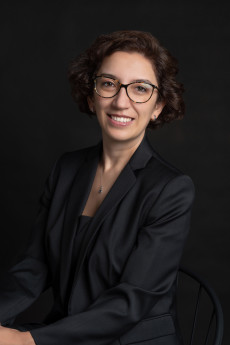Didem Unat Named SIGHPC Emerging Woman Leader in Technical Computing
September 1, 2021
By Linda Vu
Contact: cscomms@lbl.gov
Didem Unat, Berkeley Lab’s 2012 Luis Alvarez Fellow in Computing Sciences, is the 2021 ACM SIGHPC Emerging Woman Leader in Technical Computing award winner. Unat is currently an assistant professor in the Computer Engineering Department at Koç University in Istanbul, Turkey.
The ACM SIGHPC Emerging Woman Leader in Technical Computing award is presented every two years during the annual SC conference. This international award creates a career milestone achievement and also establishes a cohort of role models for students and professionals who are just getting started in the high-performance computing (HPC) field.
“Didem is an outstanding researcher who is emerging as a leader in the U.S. and EU exascale program and as an international leader in designing programming systems and performance analysis tools for the future of supercomputing extending well beyond exascale,” said John Shalf, Department Head for Computer Science at Berkeley Lab. “She is shaping the future of high-performance computing research and is on track to make substantial contributions to the field of HPC and programming models.”
Shalf and Argonne National Laboratory Computational Science Leader Anshu Dubey, who was formerly at Berkeley Lab, submitted Unat’s nomination.
“Collaborating with Didem is always rewarding because she is ahead of the field in her thinking. I expect that this is just the beginning of well-deserved accolades that will come her way,” said Dubey.
Throughout her career, Unat has published more than 50 papers, most of which appeared at top conferences and high-impact journals, attracting more than 750 citations. She also delivered a TED talk about HPC in 2019 and has established an international reputation for creating new research communities. According to Shalf, “Unat’s research has always addressed timely and difficult research challenges''.
As a Berkeley Lab Luis W. Alvarez Fellow, she became deeply involved in the early phases of the U.S. Department of Energy’s Exascale Computing Project (ECP), where her contributions to codesign and programming systems continue to have an impact on the ECP.
In 2014 she joined Koç University as a tenure-track faculty member where she was awarded the prestigious Marie Skłodowska-Curie Individual Fellowship by the European Research Commission. In 2020, she also won the prestigious First European Research Council grant in computing science for her ambitious plans to reinvent programming systems for the post-exascale era of extreme heterogeneity and a Newton Advanced Fellowship from the British Royal Society.
More recently, Unat assembled a multinational team for the 2.6M euro SparCity project for EuroHPC — one of only 10 projects funded under the EuroHPC call for a proposal that received the top and perfect score from the reviewers. The project aims to develop algorithms and tools for sparse computation.
"It is such an honor to be recognized by SigHPC as a leader in technical computing," said Unat. "Although I was only at Berkeley Lab for two years, my mentors and colleagues at the Lab have always been on my side, well after I left in 2014. They have provided me guidance in proposal writing, research, student supervision, and work-life balance. I am very lucky to have met them; their impact on my career is tremendous."
About Berkeley Lab
Founded in 1931 on the belief that the biggest scientific challenges are best addressed by teams, Lawrence Berkeley National Laboratory and its scientists have been recognized with 16 Nobel Prizes. Today, Berkeley Lab researchers develop sustainable energy and environmental solutions, create useful new materials, advance the frontiers of computing, and probe the mysteries of life, matter, and the universe. Scientists from around the world rely on the Lab’s facilities for their own discovery science. Berkeley Lab is a multiprogram national laboratory, managed by the University of California for the U.S. Department of Energy’s Office of Science.
DOE’s Office of Science is the single largest supporter of basic research in the physical sciences in the United States, and is working to address some of the most pressing challenges of our time. For more information, please visit energy.gov/science.










